“Jesus Christ, why are you wearing a suit?”
The first words from one of Ireland’s most recognisable and controversial figures in an interview with the Irish Farmers Journal. Scene set.
Ryanair chief executive Michael O’Leary is as famous as he is infamous, as liked as he loathed, but he’s many peoples’ guilty pleasure. He has that devil-may-care attitude that many of us want to have but do not have the ability to carry off. He has a relentless charisma and enthusiasm that is difficult to swallow but almost impossible not to like.
The Irish Farmers Journal exclusively spoke with the man himself in his Ryanair headquarters last week about Brexit, the beef sector, a move to the political world and his famous Gigginstown Angus herd.
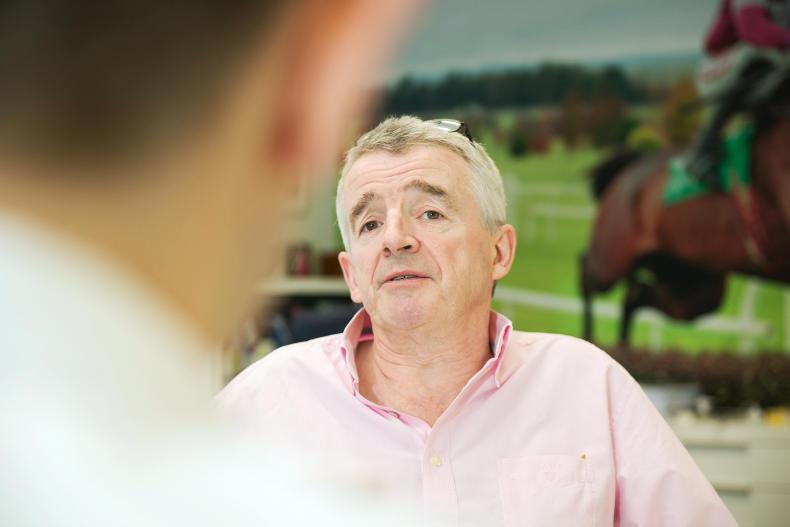
O’Leary is often considered brash, sometimes arrogant and altogether over-the-top. Having sat opposite him for an hour, all of those descriptions are true.
However, he is a man who has a genuine grá for cattle farming as well as the wider agriculture sector.
“I grew up on a farm. My mother and my father [are] both from Kanturk [and] had farms. My mother’s was a big dairy farm, my father’s was a much smaller mixed farm but he married well. Having grown up on a farm, then as soon as I had enough money to buy one, I bought a farm in Gigginstown outside Mullingar [in] 1993.”
Is the cattle farming side of Gigginstown merely golf to O’Leary? A pastime that keep him out of trouble?
“Ah no ... I like living in the countryside, I grew up on a farm, I want my kids to grow up on a farm, so it’s much more of a lifestyle choice.”
Sometimes we spend stupid money
O’Leary went to school in Clongowes Wood before going to Trinity and on to being a tax consultant with KPMG. He became a financial adviser to Ryanair founder Tony Ryan in the 1980s before working his way up to being chief executive by 1994.
Now one of the richest men in Ireland, O’Leary has grown Ryanair from a company which had a staff of 51 in 1985 to over 11,000 today. It will carry over 119m passengers this year and operates 1,800 flights daily.
The company is worth in the region of €14bn.
So, yeah, he knows a thing or two about making money. But that wasn’t always the way on the farm.
“We started off doing the usual stuff, buying in cattle in April and selling them in October and losing money every year. I thought this was a stupid way [of farming].
“I thought ... it doesn’t make any sense to be buying them every spring and selling them every autumn and losing money, so why don’t we just breed ‘em? And that way we’d make fortunes, and then of course you realise that you don’t make fortunes.”
So he set about developing the Angus herd at Gigginstown. It involved looking across the Atlantic to Canada.
“I was out in Canada for, I think, three winters in a row. I think we originally brought in a herd of 30 heifers and three bulls. Ever since we have mixed those with the best available in Perth, Northern Ireland and here in the Republic.
“Sometimes we spend stupid money. I think we spent £25,000 on a bull. It doesn’t make any sense to spend 25 grand for a bull. I wouldn’t mind but he turned out to be infertile after about three years anyway but we had plenty of straws off him at that stage.”
He describes the Angus breed with great affinity.
“I like the Angus. They’re very pretty stock, they’re smaller frame, they’re lighter on the land, they have very good maternal instincts.
“It’s a good breed because they’re reasonably easy to manage, I didn’t want to be there paying full-time vets’ bills,” he says.
The tractor pulls the plough, I don’t need a Charolais thank you very much
As kind as O’Leary is on the Angus breed, he’s as fiercely cutting of others.
“At the time when we started, about 20 years ago, all the rich fools like me were all doing Charolais and Blonde d’Aquataines.
“And Belgian Blues were very popular, which I couldn’t understand at all. They’re as ugly as sin. They’re dreadful bloody things.”
He has a special nickname for the country’s most popular beef breed – the Charolais: “Big plough puller. The tractor pulls the plough, I don’t need a Charolais thank you very much.”
Quite.
Listen to "Michael O'Leary on farming, his pedigree sale and Brexit" on Spreaker.
On to the annual Gigginstown bull and heifer sale.
It has developed a strong reputation over the past 20 years. The sale achieved a 100% clearance rate in 2016 and a 93% success rate in 2015.
“We have a very good band of buyers now, funnily enough mostly from the south of the country – Cork, Kerry and Clare and from Northern Ireland.
“Northern Ireland has been particularly good to us in the last couple of years when sterling was strong. It’ll be interesting to see what happens this year. I think the advantage is that Easter falls that bit later. I’d like to see more dairy men attend.”
What does he think is a suitable fee to get for a bull or a heifer?
“We’re at a scale with our numbers [where] it’s not so much a need for a bull to wash his face ... we’re producing the guts of 150 pedigree cattle every year. I have 75 bulls. What I really need is to clear 40 or 50 of them at least at sale.”
And what happens to those which do not make it to the sale?
“We will then sell another 10 or 15 over the year privately and then we will castrate the weaker ones. We run a pedigree herd of 250 head and commercial herd of 250 head. We generally take the bottom 25% by conformation, castrate and breed them for beef.
“We take them out of the shed and into the factory at just under two years of age … in Dunbia and Kepak. They go into the certified Angus programme.”
He speaks very highly of the initiative.
“The Angus has been well-marketed in recent years with the certified Angus programme. I think increasingly the consumer in Ireland and the UK is attracted to the certified Angus beef.”
You’re seeing among the best Angus cattle in the country without having to drive off to Carrick-on-Shannon or somewhere else to do it.
Even small suckler farmers get butterflies in the stomach selling one or two animals in the mart, so does one of the country’s richest and most successful men share this excitement on his sale day?
“There’s always a sense of excitement. We put a lot of effort into running the bull sale. We try to improve it every year. It’s not just a bull sale, the better horses are on show – War of Attrition, Don Cossack will be there this year. We try to make it interesting for people bringing kids. There’s a bouncy castle, face painting, that sort of thing.
“But it’s not a circus, it’s a bull sale. We don’t want a load of gawkers there but we do want the people who are interested in cattle. It’s a reasonably interesting day out. You’re seeing among the best Angus cattle in the country without having to drive off to Carrick-on-Shannon or somewhere else to do it. Why would you? You get to see me and, if you want, you can get your picture taken.”
Brexit game
O’Leary courts the controversial aspects of events that affect the day-to-day running of Ryanair. Perhaps the biggest of these is the UK electorate’s decision to vote to leave the EU.
He maintains the British people were “sold a pup by the Brexiteers”.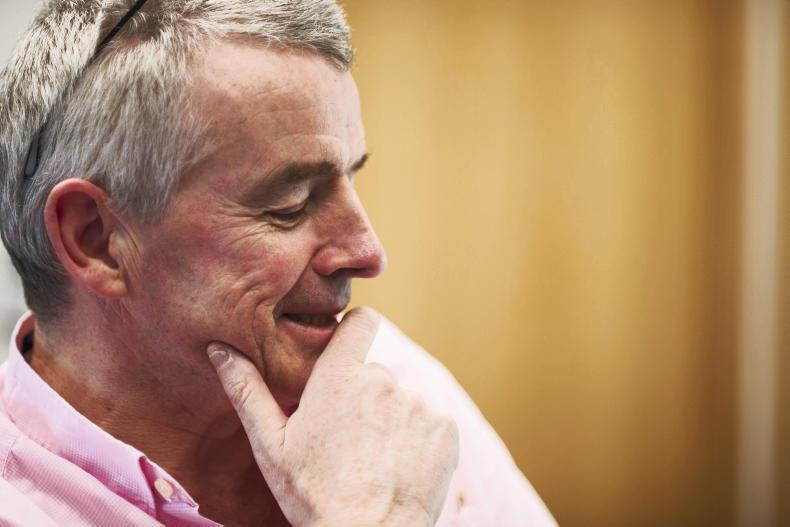
“Funnily, I don’t think Brexit will happen. I think the British will realise they made such a spectacular balls of it that within 18 months I think they’ll change their minds and decide they should stay in.”
He says Theresa May “is playing the political card she has been dealt with. I mean, she wouldn’t be prime minister if it wasn’t for Brexit but I don’t think anybody in the UK has yet realised how weak their negotiation position is and how difficult the Europeans are going to be to deal with.
“But the idea that Britain is going to leave the biggest single, open-trading bloc in the world so it can create an open economy is absurd.”
Politics
His staunch views would lead one to believe there is a closet politician in him. “Absolutely not. I think I would hate it. A, I would hate to get involved in politics and, B, I don’t think anyone would vote for me.”
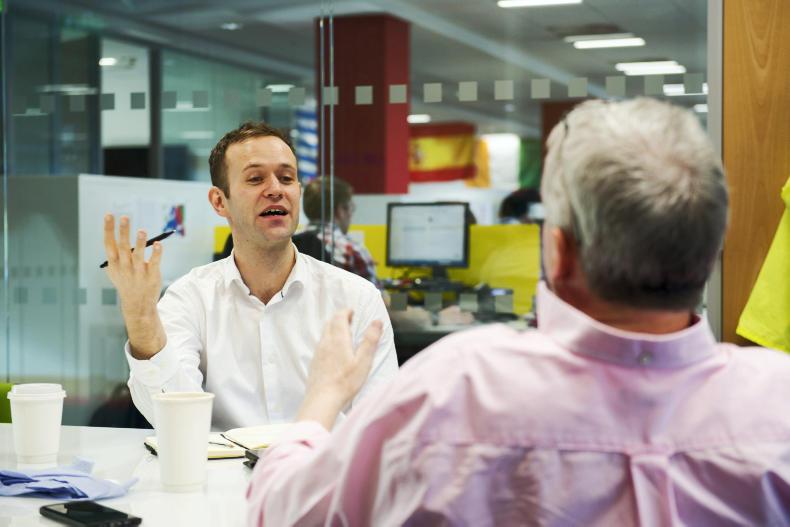
That theory would be put to the test when you hear his stance on what he would do if he was Michael Creed.
“You wouldn’t want me as Minister for Agriculture. I would want to significantly reduce regulation. There’s far too much paperwork, far too much regulation involved in farming now.”
However, as quickly as he built himself up among the broader farming population, he cut himself down with his views on small farmers.
“I’m not a great supporter of the CAP or direct subsidies from Brussels despite the fact that I get about 40 grand a year out of it. I think it’s the wrong way for farming to go.
“It sustains far too many farms that are not viable in this country. Far too many units of land that are and never will be viable.
“We need to be more efficient in our farming practices in this country and that means a lot less small farmers who are unsustainable and a lot more bigger commercial farmers who have a realistic possibility of being profitable.
“I think the New Zealand way is the way forward in all of this. Ultimately in Ireland and in Europe, we will go the same way.”
So, as a man who has built a company up from a staff of 51 to over 11,000, why not go into dairying where the most profitable are?
“Christ no, Jesus no.”
The Gigginstown House Angus sale is on Saturday 15 April at 12pm.



















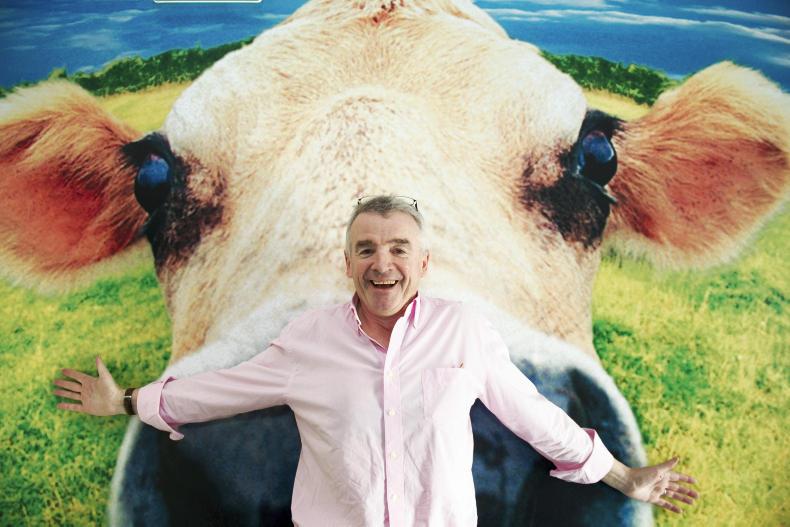


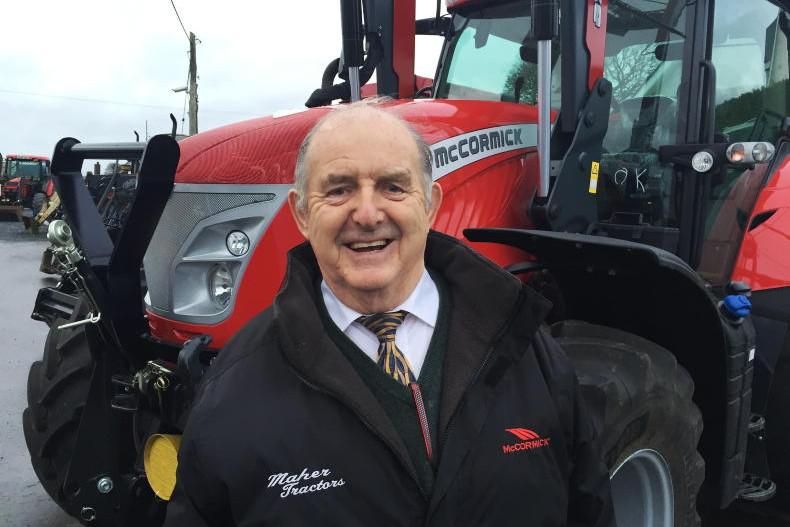

SHARING OPTIONS